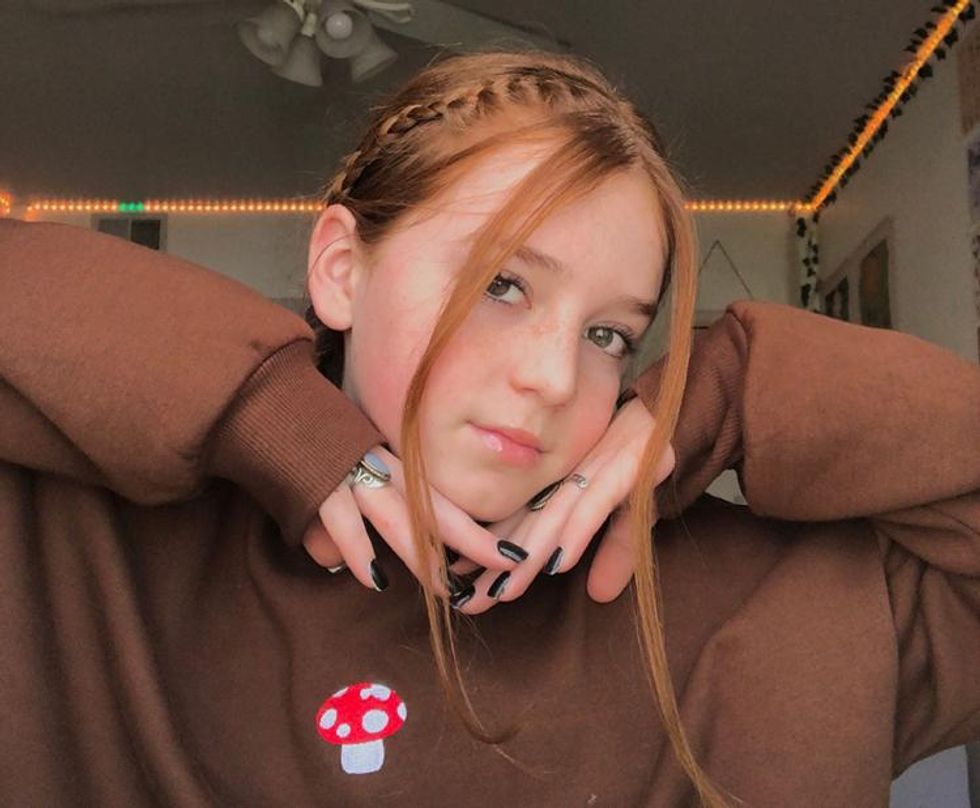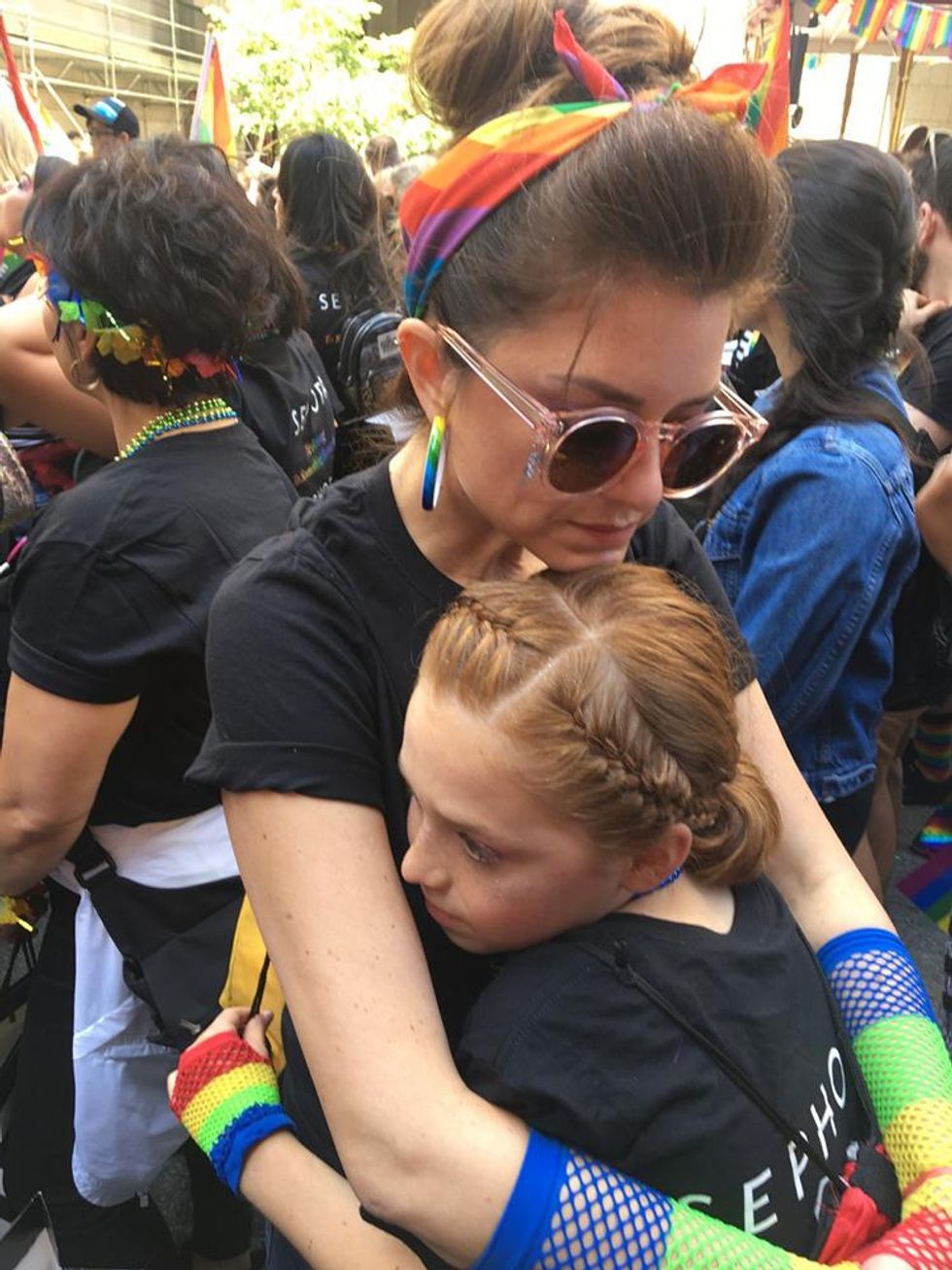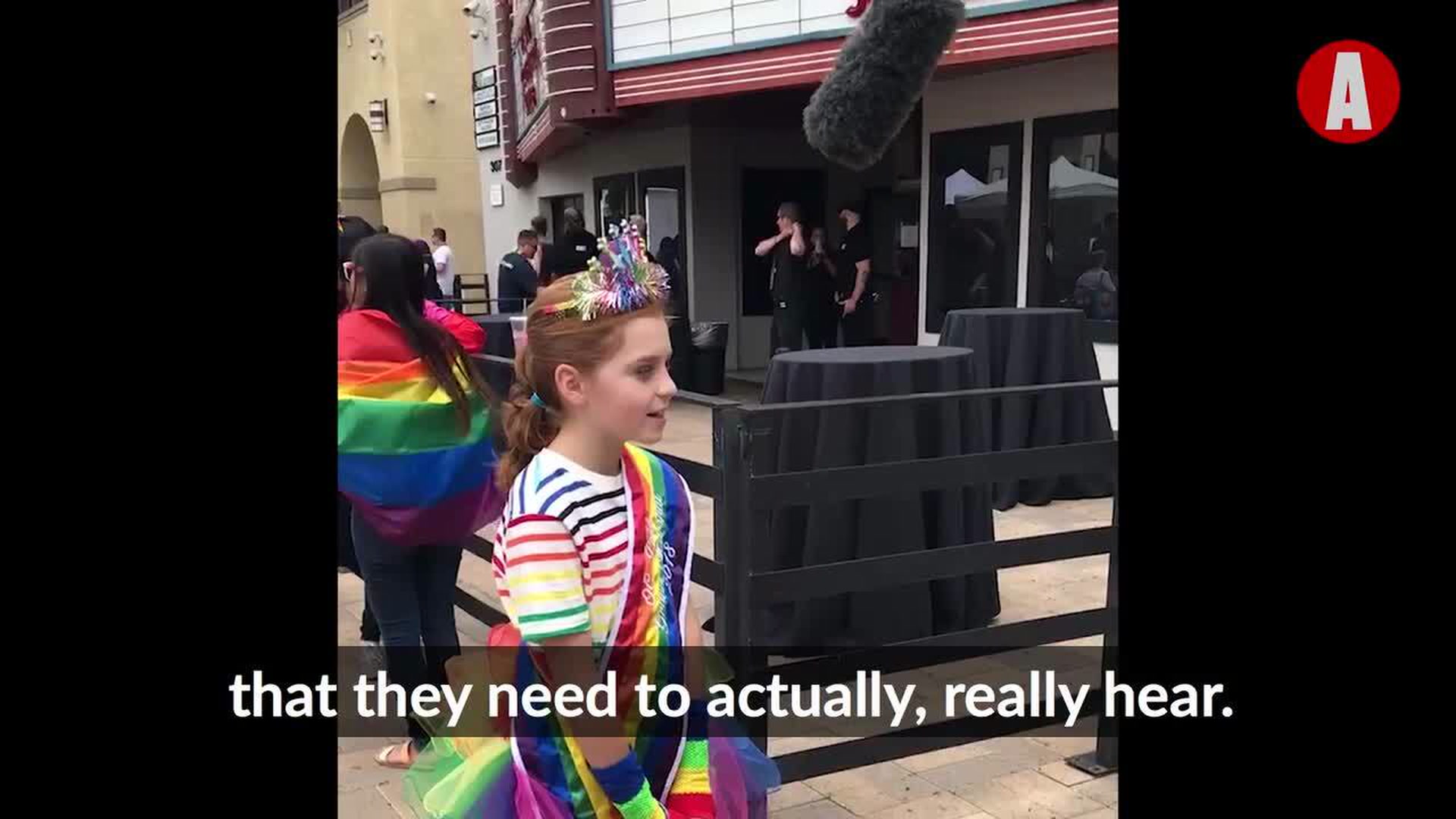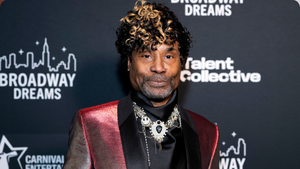The Trevor Project has released an alarming new report about the mental health of LGBTQ+ youth.
According to the 2021 National Survey on LGBTQ Youth Mental Health, only one in three LGBTQ+ young people (ages 13-24) have an affirming home. And more than 80 percent in this demographic say that the pandemic has added stress to their living situation.
The report underlines that while nearly everyone has dealt with added stress due to COVID-19, LGBTQ+ young people -- many finding themselves trapped with unsupportive family members -- are particularly at risk. In the past year, 42 percent have thought about taking their own lives, according to the report, which outlines how youth of color are particularly vulnerable.
Lori Duron is proud to say that her home is affirming for her gender-creative child, CJ. But for the author of Raising My Rainbow, which details her family's journey, there was a road to allyship as parents for her and her husband, Matt.
Below, Lori and CJ discuss this journey and the importance of creating a safe space for LGBTQ+ young people. "The statistics for LGBTQ+ kids are scary," Lori said. "Work like hell to beat those statistics. Promise to be a better parent than the generations who came before you. Practice unconditional love and make sure your child feels it. And enjoy the colorful journey!"
The Advocate: During quarantine, what was your routine as a family?
Lori: During quarantine, all four of us were home all day, every day. We tried to stick to a routine. Wake up, get ready in comfy clothes, have breakfast, do online school/work, take a walk at lunch and another walk after school/work to mark the start of the evening and have a separation between work/school and the evening.
We tried to do different things for weekend dinners -- like picking up sushi and having a picnic at a park. We tried to do things that made the weekends feel different than weekdays because the days all started to feel the same.
I was really sick with COVID for three weeks, I'm not sure what happened during that time.
We also have done more crafts than I ever thought possible. Name a TikTok or Pinterest craft and we've done it. We have about 75 pinch pots and 50 rings made of plastic beads if anyone wants some.
 Pictured: CJ
Pictured: CJ
What steps have you taken to create a safe space for CJ -- before and after the pandemic?
We've always wanted home to be a safe place for both of our boys, especially CJ. He self-identifies as gender-creative and a member of the LGBTQ community. So the world (especially school) isn't always kind to him. That's why we've always strived to make home feel safe, happy, and peaceful. For a lot of kids like CJ, home is where they have to deal with their first bullies. We knew that that absolutely would not be the case for CJ. We'd make sure of it.
He knows that he can dress how he wants at home. He's always been able to twirl in a skirt and lounge in his favorite nightgown. He can try out different makeup looks and have us tell him what a great job he did. He can try out new passions like nail art and interior design. Home has always been his place to be his most authentic self. We just have to remember to keep lots of creative supplies around because his most authentic self is very creative.
During the pandemic, especially, we focused on his mental health. Creativity has been an outlet for him. And moving his body. And talking to us. So we've done lots of creating, moving, and talking.
We are lucky that home has always been his safe place, so being asked to stay home was fine for him. I know that's not the case for a lot of kids, and that breaks my heart. My brother is gay, and home didn't feel safe for him because of it. If the pandemic had happened when he was young I can only imagine how his mental health would have suffered.
How do you make CJ feel loved and respected as a gender-creative kid?
We make sure he knows that we love him no matter what. No matter what he's wearing, who he loves, the pronouns he uses, or the things he likes to do. He knows that he has our support and that we have his back.
Can you describe an instance where you, as a parent, made a mistake?
My biggest parenting mistake was going through phases during which I'd try to get CJ to be more of a boy. I'd hide his dolls thinking that if he couldn't find dolls he wouldn't like them. I had him tested for color blindness to see if that's why he gravitated to pink instead of blue. I enrolled him in baseball instead of ballet. I thought his gender expression was a problem I could solve. I was uneducated about gender identity and gender expression. I educated myself about gender and statistics for kids like CJ. I promised to be the kind of parent he needs, not try to make him the kind of boy society expected.
What message would you send to parents who are trying to be better for their LGBTQ+ kids?
Have an open heart and open mind. Be patient. Follow your child's lead. Let your child tell you who they are -- instead of telling your child who they are supposed to be. Learn about the differences between sex, gender, and sexuality, and the LGBTQ+ community. The statistics for LGBTQ+ kids are scary. Work like hell to beat those statistics. Promise to be a better parent than the generations who came before you. Practice unconditional love and make sure your child feels it. And enjoy the colorful journey!
What message do you have for parents who are not supportive?
Parents struggle to be supportive because their child isn't what they expected or isn't fulfilling their expectations. Or they struggle to be supportive because they are worried about what other people will think or say about their child or their parenting. Parents of LGBTQ kids have to let go of expectations and stop caring what other people think. Your expectations are the problem, not your child.
And we aren't here to make strangers comfortable with our children, we're here to make our child comfortable with themselves. That's all part of healthily launching our children into adulthood.
Besides Raising My Rainbow, what other resources can you recommend?
PFLAG for sure, Gender Spectrum, and books by [the clinical psychologist] Diane Ehrensaft.
Interview With CJ:
 Pictured: Lori and CJ at Pride
Pictured: Lori and CJ at Pride
The Advocate: What is the impact of having a supportive family on your mental health?
CJ: I know I'm in a safe environment and I can be myself. That's good for my mental health. I don't have to hide myself. I don't have to worry about what my family is going to say to me or how they will react to me. Knowing I can be totally myself 100 percent of the time is good for my mental health. I know my parents love me the way I am, and that is really healthy.
My family has helped me so much, and it makes me so sad that some LGBTQ+ people don't have supportive families and they have to hide who they are -- because if they show who they really are, they might end up with no one who loves them.
What was the most meaningful thing they ever did for you, to show that you were supported as a gender-creative kid?
My parents took me to my very first Pride parade and festival because they knew I'd love it and I did. They always love me and they are proud of me. I also know that if people are mean to me or bully me, my parents are always there for me. My parents will listen to me talk about being bullied, they will comfort me, they will help me stand up for myself or they will stand up for me. They also make sure that I know my rights.
What message do you have for kids who are struggling in quarantine with their families right now?
I wish I could tell them to be themselves and not worry about what other people think, but that's not safe for some kids because their parents are mean to them or don't approve of them and they aren't safe at home.
They need to keep themselves safe. Don't give up hope, and always believe that things will get better. They should try to find supportive friends or supportive adults and find places that are safe and safe people to talk to. They should also try to find things that make them happy or ways to express themselves, like art or music or writing.
See an earlier interview with the Durons below. Need help or more information? The Trevor Project is the world's largest suicide prevention and crisis intervention organization for lesbian, transgender, bisexual, gay, queer, and questioning young people. The group offers a number of volunteer opportunities for adults, such as its 24/7 TrevorLifeline (866-488-7386), TrevorChat, and TrevorText programs, which offer young people feeling suicidal an avenue to talk.


 Pictured: CJ
Pictured: CJ Pictured: Lori and CJ at Pride
Pictured: Lori and CJ at Pride


































































Charlie Kirk DID say stoning gay people was the 'perfect law' — and these other heinous quotes